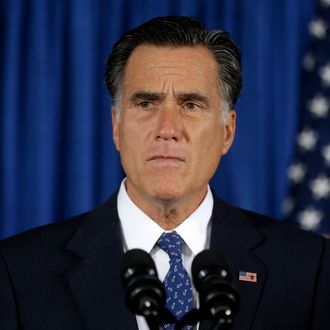
Harry Reid isn’t the only person who was left unsatisfied by Mitt Romney’s Friday “tax summary” release. Unsurprisingly, a spokeswoman for the Obama campaign said on Saturday that the information only raised more questions about Romney’s tax life, such as:
>Why were more than 65% of pages related to overseas investments? Why did he have investments in a Chinese oil company? Why did he have dozens of foreign accounts and million stashed away in tax havens like the Caymans?
Obama’s people are sure to make many, many similar questions in the coming weeks. Our main question is: Why would Romney invite renewed interest in his tax returns — and his continued refusal to actually make them public — when the issue had largely faded from the headlines?
Obama’s people are sure to make many, many similar questions in the coming weeks. Our main question is: Why would Romney invite renewed interest in his tax returns — and his continued refusal to actually make them public — when the issue had largely faded from the headlines?
It certainly doesn’t seem like a great way to distract people from his leaked observations about what 47 percent of Americans pay (or, in his view, don’t pay) in taxes, though it’s one possible explanation. After all, as Politico notes, “Providing information about his own tax rate seems geared toward eliminating the question about whether he himself has at any point not paid taxes.” Still, that’s not much of a gain — Reid is probably the only person in the world who still really believes that Romney managed to avoid paying taxes entirely — and the candidate’s effective tax rate of 14.1 percent will strike most people as low with or without the details provided in the summary.
The Romney campaign has described the disclosure as the result of an effort to make good on a statement he made in August, when he told an interviewer that he’d check his tax returns to make sure that he’d paid a rate of at least 13 percent over the last ten years. “Following that,” an aide said, ”[Romney] decided to go ahead and release this summary information covering the last 20 years.” That explanation doesn’t make the decision sound like a terribly well thought-out maneuver. Indeed, observers mostly seem to think it was a blunder:
“My initial reaction to it is, once again, the Romney campaign wants the worst of both worlds,” said Democratic strategist Jonathan Prince. “All the summary does is raise lots of questions on what the summary hides. At the same time, it completely left everyone hungry for more. … (And) they’re conceding that (that) information is somewhat relevant to being asked for and they’re also continuing to hide it. It’s not like they’re trying to have it both ways — they’re trying to lose it both ways.”
Even people on Romney’s side said basically the same thing:





























